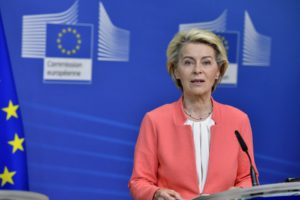Security measures were increased in the area, to block the access of the protesters, who raised flags and placards with their demands. There were two distinct protests: one of the rural coordination, to denounce the import of products from countries like Ukraine, which are not subject to the same rules as in France, and another one of a confederation that opposes the new genetically modified organisms. Protests have recently taken place in several European countries. Spanish farmers blocked traffic on some of the most important highways on Tuesday, joining their European counterparts protesting high costs, bureaucracy and competition from non-EU countries. Many took to the streets with tractors, creating traffic jams throughout the country. Like their colleagues in France, the Netherlands, Belgium and Portugal, the Spanish farmers complain about the cumbersome European bureaucracy, the low prices they receive for their produce and the rising costs.
Farmers in Greece also protested almost all over the country, strengthened regional roadblocks and organized rallies with tractors. They are asking for the revision of the Common Agricultural Policy of the EU, which, in their opinion, has considerably reduced their incomes, as well as for compensation for the losses suffered due to the high prices of the products necessary for crops. Demonstrations also spread to Germany and Poland. Italian farmers are also preparing for large-scale demonstrations in the coming days. Bulgarian farmers also protested on Tuesday by temporarily blocking the main roads and border-crossing points, including with Romania. At the end of last week, the government coalition in Bucharest reached an agreement with farmers and transporters. In Romania, hundreds of farmers and truck drivers protested against rising business costs, with convoys of tractors and trucks, thus slowing or blocking traffic on national roads near major cities, including around the capital. Also, the protesters briefly blocked a border crossing with Ukraine and tried to cut off access to the Black Sea port of Constanţa.
Mihai Pelin, Radio Romania International











